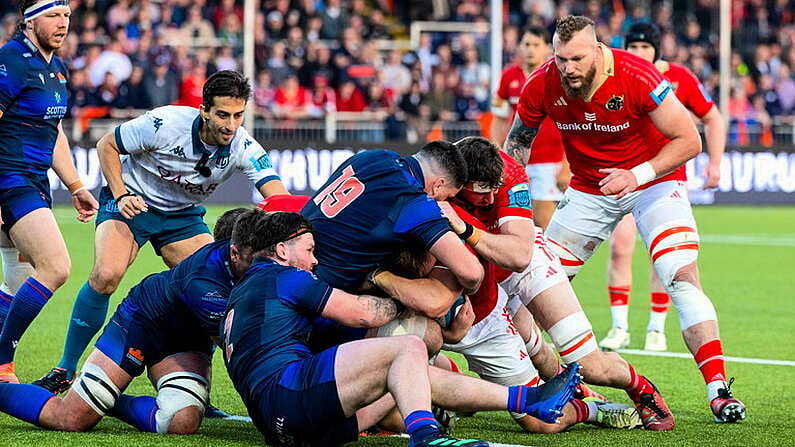A life, Jimmy. It's the s**t that happens while you're waiting for moments that never come. - The Wire
One of the reasons The Wire is regarded as the finest TV series of all time - and the reason it is discussed in exasperated syllables as nobody has a vocabulary to sum it up - is its ability to summon pithy aphorisms for the meaning of life, like the one above.
Not that they always get it right.
No, because for some, the waiting for moments that may never come is exactly what life is.
****
English surfer Andrew Cotton is one of these people. He is the subject of a documentary entitled Beneath The Surface, presented by RedBull.TV, which focuses on his pursuit of an elusive wave off the North-West coast of Ireland. The wave emerges a handful of times every year, and given how changeable the Irish weather is, it appears with only a few hours notice.
The chase of this wave is the latest thrill to motivate Andrew Cotton. He rose to prominence in 2014, when he rode the largest wave in the world. It appeared off the coast of Portugal, and measured an estimated eighty feet. Prepare to be amazed/terrified:
Unfortunately, Cotton's terrifying achievement was not officially recorded as a world record as the ride was incomplete, by virtue of the fact Cotton fell at the end. Cotton does not mind missing out on a world record, however, as he told Balls.ie:
When you're facing the wave,you’re not thinking about world records. I just love surfing big waves, and for those couple of seconds when you’re surfing the big waves - and there are only seconds - there is nothing going through your head, because you’re in the moment.
You have to be in the moment to surf those kinds of waves. It’s afterwards when you're back on dry land, that those kind of things sink in. On that day in particular in 2014, it was definitely the biggest wave I’ve ever seen in my life.
Cotton has been obsessed with surfing from an early age: he was born in Plymouth, and began surfing in North Devon from the age of seven. North Devon is not known for its tall waves, instead it is a breeding ground for professional surfers who make their living in competitions. Cotton dreamed of being a professional surfer, but found he wasn't cut out for competitions, meaning he ended up chasing the largest waves in the world as a result of a remarkable compromise:
Small wave contest surfing is quick, gymnastic and very technical, focusing on quick manoeuvres. You have to be really technical, some of the moves the kids are doing now are amazing, and something I always dreamed I could do. Unfortunately I can’t!
But I was so bad at small waves and even worse at competition surfing, so I just found my niche.
Whereas the competition surfing requires the technical skills that Cotton believes eludes him, big-wave surfing is as much a What mental challenge as it is physical or technical.
Big wave surfing for me is more of a mindset. Obviously you have to have a level of fitness and basic skills, but it comes down to of you really want it, and if you do really want it, you can get it. All you’ve got to do is power on and put your head down, and commit. There’s no halfway house, if you’re going to go you gotta go.
The mental preparation, you can get that through your training: when you are super fit, and if you've been doing breath training (learning to keep your breath underwater for longer), that helps you mentally.
Visualising what you actually want is important. I’ll go into big wave sessions, and I’ll be focussed on achieveing one thing. It may look to an outsider as reckless or dangerous, but for me its not. Its quite calculated, and I listen to myself and the feelings in my gut.
If it doesn’t feel right, I won’t go for it. I’m happy to listen to how I feel.
With Cotton unable to make a career professionally through competition surfing, he decided his best route to professionalism was to stay in the industry, and thus worked in a surfboard factory until he was 25. Eventually, the pressures of trying to make ends meet became too much, and Cotton walked away to become a plumber. Eventually, however, he could not resist the pull of his passion:
After ten years of working in the surfboard industry, I walked away from all of it, and retrained as a plumber. But soon I came to the realisation: for the first time ever I had a little bit of cash, but couldn’t go surfing whenever I wanted. I decided that, actually, I don’t want to do this, I’d rather go broke and be able to go surfing.
At that time I had no plan, I quit my job and trained as a lifeguard to work during the summer and travel in the winter.
But it’s working in a passion, and you’ll never work a day in your life. But if you’re working just for money, is it worth it? I’m not sure if it is.
Cotton admitted that he was miserable while working as a plumber, and credits his wife Katie - a musician - with supporting his decision. Cotton balances the pursuit of the biggest waves across Europe with the more prosaic aspects of home life with two children, while all the time working part-time as a plumber to help make ends meet.
Following the riding of the 80 ft wave, Cotton has set his sights on his next conquest being on Ireland's Wild Atlantic Way, around eight miles off the northwest coast of Ireland. This is the unique aspect of surfing, and what is captured in the documentary. Cotton's preparation is as mental as it is physical, and leans heavily on visualisation techniques, so as to be best prepared for the daunting challenge ahead.
Yet the sport hinges so strongly on weather conditions, meaning that even predicting the date of an event is nigh-on impossible, a ludicrous fact when you consider how vital visualisation techniques are to the endeavour.
Cotton has had his eye on attacking the wave off the Irish coast for years, yet it has yet to appear. All he can do is use weather forecasts to predict when it is likely to arrive, while at the same time making ends meet in Devon.
I’ve been watching this wave for a long time, and I’ve gone on a few missions out there. It’s a scary place, but you could see the potential, so it's exciting. The location brings loads of different elements of danger and logistics as to how to do it. Obviously the weather in Ireland changes very quickly, so it can be very difficult to get out there in time to surf it.
It was a particularly bad year [2015] for big waves in Ireland, and as a surfer, what I was visualising, and we thought we would get... we didn’t get anywhere near what I thought. What we did get, however, was a clear image of the potential there,and that’s what’s exciting.
Now I know how it does work, so when those magic numbers do come up, I’ll be ready.
Whereas the Olympics will feature countless stories of athletes making extraordinary sacrifices in their personal lives for a shot at immortality. They, at least, have the comfort of a clear and defined schedule. Cotton, by contrast, is training for a race without knowing when it'll be held. Therefore, is his passion in the exhaustive chase - sometimes lasting years - for a few serene seconds atop the biggest waves in the world?
Those kind of things motivate me. I’ve never been tied to a schedule, and I don't want to be.
Waiting is exciting. I can ride the biggest wave in my life next week, but the next week I might ride a bigger one, or someone else might. It’s not like climbing Mount Everest. When you've climbed it, you;ve climbed the tallest mountain in the world; a bigger mountain wont pop up the following day. With surfing, it's different. It’s never-ending, and that’s what motivates me.
Andrew Cotton: a man who knows that life is worth living for moments that may never come.












